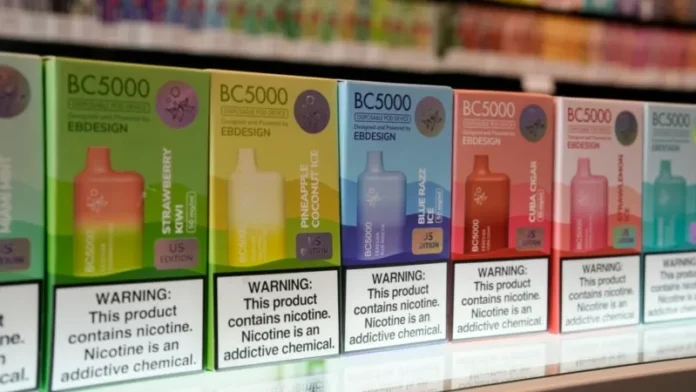The U.S. Supreme Court is taking on a controversial case involving e-cigarettes, as it considers whether the Food and Drug Administration (FDA) was right to block the marketing of sweet and flavored products. This decision comes amidst a surge in vaping among young people, raising concerns about the potential health risks and the impact on the future generation.
Vaping companies argue that the FDA unfairly denied over a million applications to market fruit or candy flavored versions of nicotine-laced liquid, which is heated by the e-cigarette to create an inhalable aerosol. These flavored vapes are technically illegal, but they are widely available in convenience stores, gas stations, and vape shops. The FDA recently approved its first menthol-flavored electronic cigarettes for adult smokers, but the debate over flavored products continues.
The FDA has been facing regulatory delays for years, as it tries to bring scientific scrutiny to the multibillion-dollar vaping market. The agency is concerned about the increasing number of young people using e-cigarettes, with nearly 20% of high school students and almost 5% of middle school students reporting use in 2020. The majority of these young people are using flavored products, according to court documents.
The FDA argues that sweet and flavored e-liquids pose a “serious, well-documented risk” of enticing more young people to pick up a nicotine habit. The agency says that the companies were blocked because they could not prove that the potential benefits for adult smokers outweighed the risk of underage use. However, the companies claim that they had prepared detailed plans to avoid appealing to young people.
In a victory for the vaping companies, the U.S. 5th Circuit Court of Appeals sided with them and threw out orders denying the marketing of e-liquids with names like “Jimmy The Juice Man in Peachy Strawberry.” The court found that the FDA was unfair in its decision because it required the companies, without warning, to present studies showing that flavored products would help with smoking cessation.
The FDA has appealed this decision to the Supreme Court, and the case is expected to be heard in the fall. Other appeals courts have sided with the FDA, which regulates new tobacco products under a 2009 law aimed at curbing youth tobacco use. This case has sparked a heated debate about the role of flavored e-cigarettes in the fight against smoking and the protection of young people’s health.
Vaping companies have long claimed that their products can help reduce the toll of smoking, which is responsible for 480,000 U.S. deaths annually due to cancer, lung disease, and heart disease. However, the rise in youth vaping has raised concerns about the potential long-term health effects and the impact on future generations.
While youth vaping has declined from all-time highs in recent years, about 10% of high school students still reported using e-cigarettes last year. This is a significant number, and it is essential to address the issue to protect the health and well-being of our youth.
The Supreme Court’s decision in this case will have a significant impact on the future of the vaping industry and the regulation of e-cigarettes. It is crucial to strike a balance between protecting young people from the potential harms of flavored products and allowing adult smokers to access potentially less harmful alternatives.
The FDA’s review of the vaping market is a step in the right direction, as it aims to bring scientific scrutiny to the industry and regulate it effectively. However, it is essential to consider the potential benefits of flavored products for adult smokers and to find a way to prevent their appeal to young people.
In conclusion, the U.S. Supreme Court’s decision on the e-cigarette case will have far-reaching consequences for the vaping industry and the health of our youth. It is crucial to find a solution that balances the protection of young people with the potential benefits of flavored products for adult smokers. Let us hope that the court’s decision will pave the way for a safer and healthier future for all.

